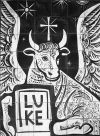
THE GOSPEL OF LUKE
The Announcement to Mary: Lk 1,26-38
In verse 26 a new phase of the story opens. This is a verse which is packed with information. "In the sixth month" links it to the preceeding episode and provides a time, linked not to great events but to Elizabeth's pregnancy. The place, an obscure village in Galilee, could hardly be more different to the Temple in Jerusalem of the previous scene.
It is now clearly stated at the beginning that the angel Gabriel was sent by God.
Verse 27 then increases our expectations concerning this scene. The reference to a virgin recalls Isaiah: a young woman is with child (Is 7,14, quoted by Matthew, Mt 1,23). In the Greek Old Testament known as the Septuagint, the young woman becomes a virgin and this is the understanding of the Gospels. Modern translations which use the Hebrew "handmaid" may not make this clear. It is only at the end of the verse that we are told that the young woman's name is Mary.
She is though betrothed or engaged to Joseph and Dt 22,23 shows that this would have been a serious commitment. Again, it is Matthew (Mt 1,19) who makes this point clear.
The reference to the house of David makes the encounter between David and Nathan in 2nd Samuel a key to understanding this scene. That episode in chapter 7 revolves around various meanings of "house". David having built a house, a palace, for himself, wants to build a house, a temple, for God. The God of Israel being a God of the desert does not want to be tied down to a Temple but then he does promise a house, that is a dynasty, for David (2 Sam 7,16.19). Joseph of the house of David (1,27) therefore becomes the heir to the promise made to David.
The angel's greeting again shows Luke's biblical style, which here recalls the angel's greeting to Gideon (Judges 6,12) or Boaz addressing his reapers (Ruth 2,4).
Mary is far more troubled by the angel's greeting than was Zechariah though without his fear (1,12).
In verse 31, the promise of a child recalls the promise made to Abraham and Sarah (Gen 17,16) as well as the birth of Samson (Judges 13,3). There are also the great messianic prophecies of Isaiah (Is 7,14 as we have seen and also Is 9,7).
"Most High" is a way of refering to God.
"The kingdom without end" appears in the late prophecy of Daniel (Dan 2,44 and 7,14) when there was much interest in future expectation. Dn 7,14 in particular has had enormous influence on Christian thinking.
"House of Jacob" also has echoes in the Old Testament as a way of referring to the Israelites (Gen 46,27).
There are those in the OT who voiced their concerns about their mission, Gideon for example (Judges 6,11-16) or Jeremiah (Jer 1,6).
The role of the Holy Spirit announced in verse 35 is important for these opening chapters and indeed in the whole Gospel. The Holy Spirit is already present with John (1,15) but whereas John will be great in the sight of the Lord, Jesus will actually be the Son of God.
That nothing is impossible for God (verse 37) recalls what was said to Abraham and Sarah (Gen 18,14). Sarah like Elizabeth (verse 36) conceived in her old age.
Verse 38 gives Mary's reaction. "Servant" would be better than the traditional "handmaid" as it captures the sense better, for example the servant of God in Is 49,3. (The word in Greek is the feminine of "servant" or "slave".) Mary's acceptance of God's word will be stressed a little later by Elizabeth (verse 45).
We can now return to the main page.
John and Jesus
The two accounts unfold in parallel as we have seen but Jesus will be far greater than John.
- John will be great before the Lord (1,15) but Jesus will be great and Son of the Most High (1,32).
- John will be born of an old woman but Jesus will be born of a virgin.
- John will prepare a people (1,17) but Jesus will rule the people (1,33).
- John's role will be short term (1,17) but Jesus' kingdom will be eternal (1,33).
- John will be a prophet, Jesus will be Son of God.
Return to the main page.
